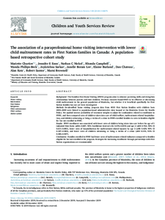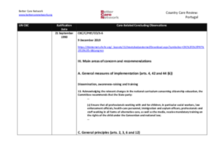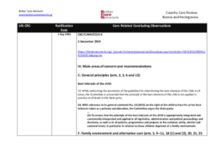Displaying 161 - 170 of 911
This study examined the moderating effect of maternal parenting self-efficacy on the relationship between mothers’ childhood abuse experience and their abuse of their children with intellectual and developmental disabilities (IDDs).
The 2019 United Nations General Assembly (UNGA) Resolution on Follow-up to the twentieth anniversary of the International Year of the Family and beyond can be found on pages 48-51 of the Report of the Third Committee on Social Development. The Resolution highlights a number of concerns and recommendations regarding children's care
Social practice theory (SPT) was used as a theoretical and analytical framework in a study which investigated ‘successful’ professional practices when working with parents with learning difficulties where there are concerns about child neglect.
Drawing on the findings of a Churchill Fellowship study tour, this article discusses the need to expand understanding of family engagement and, in particular, to implement Family Inclusive practice in Australian child welfare, both to increase reunification and to improve outcomes for children who do not return home.
This qualitative study examines the Minnesota One-Stop for Communities Parent Mentor Program (MPMP). African American parents previously involved in the child welfare system conceptualized and spearheaded this program for parents currently involved in the system to reduce the involvement of families of color in child welfare, provide support and build protective factors.
This article investigates the efficacy of the Families First Home Visiting (FFHV) program, which aims to enhance parenting skills and strengthen relationships between parents and their children.
This country care review includes the care related Concluding Observations adopted by the Committee on the Rights of the Child and the Committee on the Rights of Persons with Disabilities.
The present review addressed the research question What evidence is there that parenting interventions conducted with parents who maltreat their children, reduce the incidence of further child maltreatment?
This country care review includes the care-related Concluding Observations adopted by the Committee on the Rights of Persons with Disabilities and the Committee on the Rights of the Child.
This study aims to assess possible changes in family and parental dynamics among families taking part in a short (6‐session) universal program.





